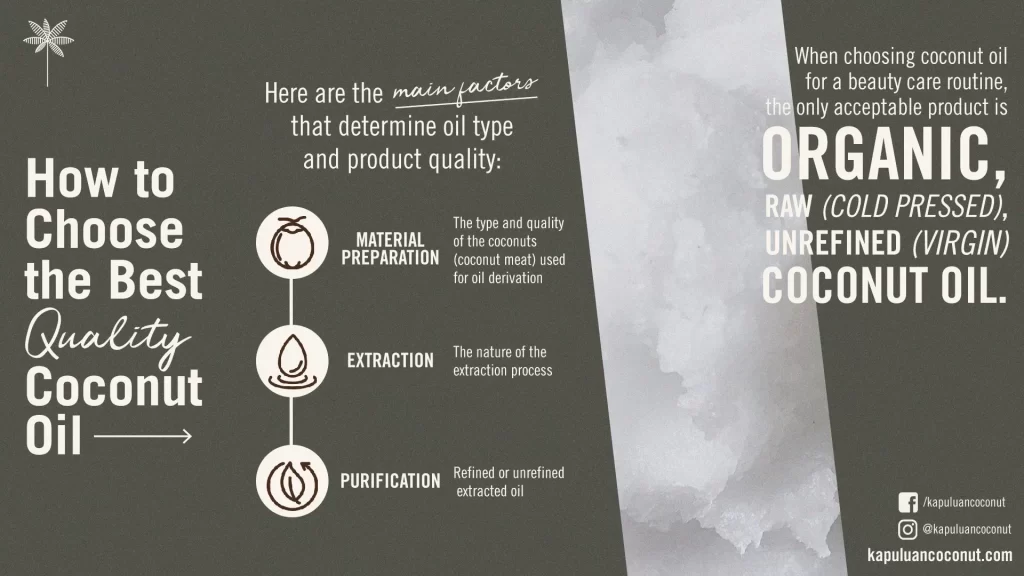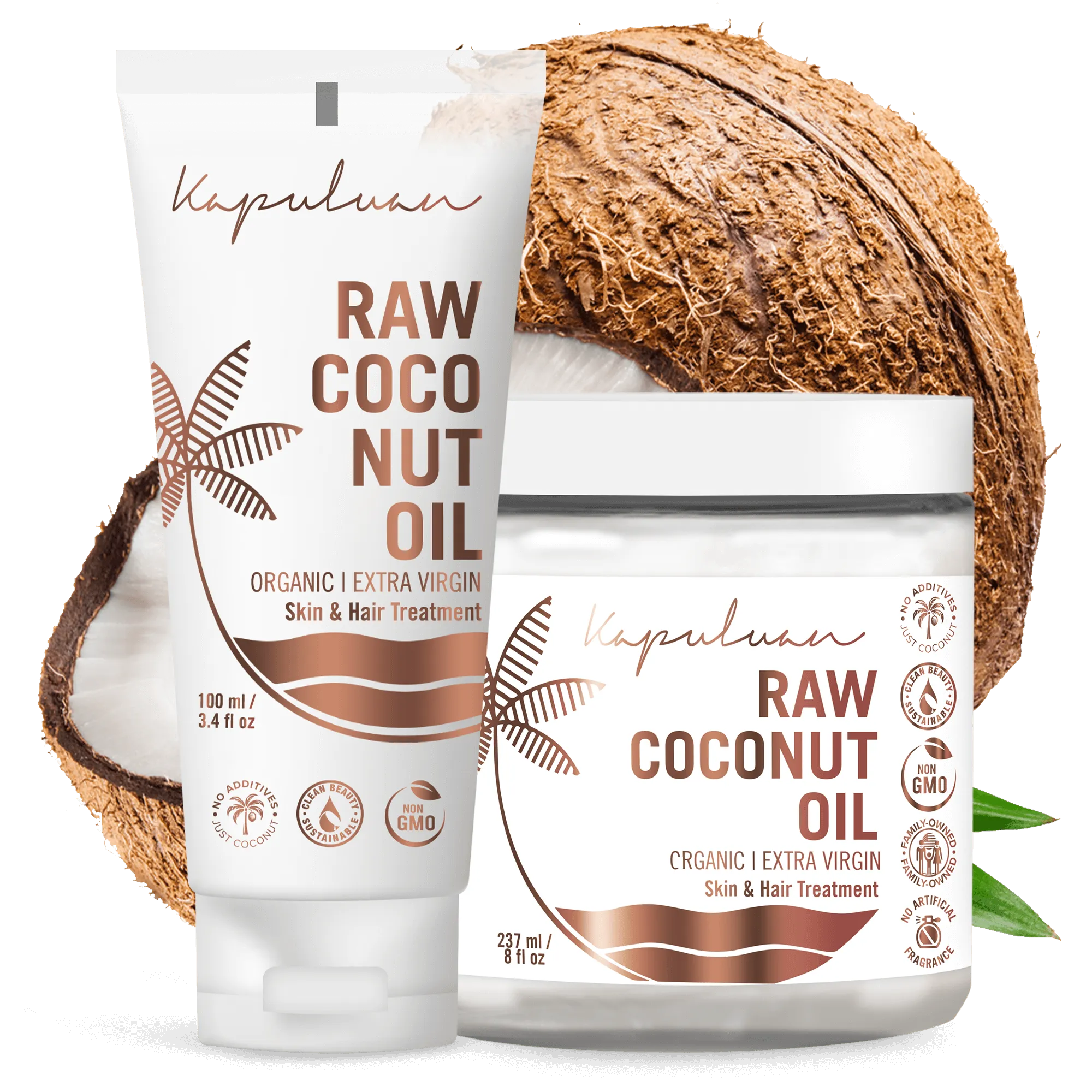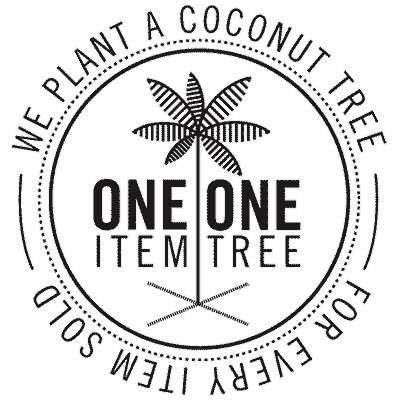
What is the best coconut oil for skin and hair? Is refined or unrefined coconut oil better? And how do you determine if what you choose is the best?
The two most popular terms used to describe oil as a product, “refined” and “unrefined,” are not difficult to decode. A product that has gone through a refining process is labeled as “refined.” On the contrary, an “unrefined” oil product is a 100% pure, natural product without a refining process.
Whether or not the oil has gone through a refining process predetermines the quality of a final product. However, several other factors also affect the overall product quality.
Besides refined vs. unrefined coconut oil, many other terms label the product, such as: “virgin,” “extra virgin,” “organic,” “cold-pressed,” “expeller pressed coconut oil,” “centrifuged,” “fractionated coconut oil,” etc.
Therefore, thanks to the many creative uses of these terms, it has become challenging to determine the product’s true origin. This includes its quality level and refined vs. unrefined coconut oil benefits for skin and hair care, such as healthy saturated fats. In addition, the prices of coconut oils vary, suggesting a difference in oil types and levels of quality and effectiveness, especially for sensitive skin and hair types.
Quality vs. Quantity
In the consumerist world we live in, two types of companies rule every industry:
- Those that prefer quality over quantity and offer a credible product for a reasonable price
- Those that prefer quantity over quality to make more profit by selling millions of products at a lower price while ignoring the level of quality they deliver
With the myriad of brands and products available, how does someone find the purest, high-quality oil that delivers all the well-known benefits of the coconut? What is the difference between refined vs. unrefined coconut oil? Is refined or unrefined coconut oil healthier? Let’s take a look at some factors and considerations.
How to Choose the Best Quality Coconut Oil
Here are the main factors that determine oil type and product quality:
- 1. Material Preparation: The type and quality of the coconuts (coconut meat) used for oil derivation
- 2. Extraction: The nature of the extraction process
- 3. Purification: Refined or unrefined extracted oil
Sourcing remains a factor that does not impact the quality of the product yet impacts our ecosystem. However, responsibly-sourced coconuts from sustainable sources used in oil production have a positive long-term impact. This helps the coconut-cultivating communities and contributes to the long-term wellness of the planet.
Let’s look at all these factors separately and how they affect the quality of the product. This will conclude which type of oil is best for skin and hair.
1. Material Preparation – Fresh Coconut Meat or Copra
Coconut oil can be extracted from freshly harvested coconut kernels, sun-dried coconut meat, or copra.
The oil extracted from fresh coconut meat becomes cold-pressed and packed, retaining the purest form of the oil. This preserves all the beneficial nutrients of the coconuts. Therefore, coconut oil from fresh coconut meat usually requires no additional treatment.
Conversely, another widespread practice used in preparing the production material involves sun-drying the coconut meat for oil production. Workers scoop the fresh coconut meat and leave it to dry under the sun. Or in some cases, smoke or other methods speeds up the meat’s drying process. Then, the dried coconut meat is transported to industrial oil mills for further treatment and derivation.
The drying process dramatically affects the quality of the production material. This includes the aroma, taste, and nutritional content of the coconuts. The oil derived from copra is smoky and can be rancid. This oil requires further treatment to achieve a commercially acceptable product.
Organic or Non-Organic Coconut Oil
The term “organic” relating to coconut oil refers to how the coconuts used in oil production were cultivated or produced. The growing process directly affects the quality of the coconut kernels and the quality of the coconut oil.
What gives organically grown coconuts the credibility of high quality is the certification that ensures the coconuts were cultivated without synthetic, i.e., artificial pesticides, fertilizers, herbicides, or genetically modified organisms (GMOs).
In ordinary practice, coconuts grown on small, local farms are “naturally” organic. The use of pesticides of any kind is seldom practiced. This is primarily due to the nature of the coconut palms, which, unlike other crops, do not depend on industrial farming and the heavy use of chemicals for intensive production.
However, when sourced from commercial plantations where pesticides, fertilizers, and herbicides are more frequent, a certification guarantees the kernels cultivated are chemical-free.
Organic Labeling
Organic certification agencies provide the “organic” label. And different agencies have different policies. However, most of them distinguish the products according to their cultivation process. So, for example, a product labeled organic might not be derived from chemically-treated coconuts, but the chemicals might be used in the later stages of derivation and refining.
Additionally, an organic label may also refer to organically-grown copra. Therefore, the label itself does not guarantee the product is chemical-free. It only states that the product was produced using naturally-grown coconuts. So, it could be copra unless it’s organic “unrefined” coconut oil.
Note: Organic certification of coconut oil does not guarantee that the oil is natural and unrefined.
2. Extraction – Expeller Pressed vs. Cold Pressed/Raw or Heat-Generated Oil
There are two main approaches to oil extraction:
- 1. An extraction process that does not use heat
- 2. An extraction process that uses high heat (or chemicals)
Exposure to heat during the derivation process negatively affects the quality of the solid or liquid coconut oil. Therefore, the lower the temperature during derivation, the higher the oil quality.
Cold Press Extraction
As the name implies, you get cold-pressed coconut by applying high pressure to extract oil from fresh coconut meat without high temperatures. You can avoid high heat using a hydraulic press or cold-pressed oil expeller machines. “Cold pressing” does not designate the type of pressing machine used. However, oil labeled “cold-pressed” should not have been exposed to high heat before or after pressing.
The cold-pressed or raw coconut oil should not be heated above 96° F, at which point it starts losing its naturally occurring enzymes. You should avoid reaching this temperature to preserve all the beneficial nutrients and enzymes. As a result, you get an expensive product.
High Heat Extraction
Aside from cold pressing, there are many other types of extraction processes. However, they all require higher temperatures or chemicals and solvents for oil derivation, thus negatively affecting the quality of the oil. Furthermore, as mentioned before, heat ruins the nutritional content of high-quality material.
However, these processes are mainly used with copra, where the oil derived requires further treatment with solvents and chemicals. This separates the oil from debris, removes its unpleasant aroma, and bleaches it to a clear white color. Therefore, expeller pressing and chemical extraction remain the most common methods to extract a high quantity of oil. This oil goes through a refining process that includes bleaching and deodorizing to achieve a commercially acceptable product.
3. Purification – Difference Between Refined and Unrefined Coconut Oil
Whether or not the oil goes through a refining process dramatically determines the quality of the product (material) used for oil derivation and the type of derivation process. These two factors affect the density of the nutrients preserved in the oil. This also affects the benefits the final product provides for the consumer.
Unrefined
Unrefined coconut oil, commonly known as “virgin” or “extra virgin” coconut oil, refers to two similar terms for the same product type. It encompasses oil derived from fresh coconut meat cold-pressed, meaning minor treatments are used to naturally retain purity, smell, and taste.
No harmful solvents and chemicals are used during this process, and the oil can be labeled as a virgin, extra virgin, unrefined, cold pressed, raw, and 100% pure natural oil.
Refined
Conversely, refined coconut oil has been explicitly treated during or after extraction. Moreover, the oil can deliver different levels of quality and effectiveness. This depends on the quality of the material in the first place. They were followed by the extraction process’s roughness level (temperature and amount of solvents used). Plus, the additional chemicals used after derivation for the oil to appear odorless and clear.
Comparing and evaluating the material used, the extraction and refining processes will place them in a different position on the quality scale. However, they will always be second to an unrefined product.
The lowest quality oil would be derived from copra, treated in oil mills with high temperatures and chemicals, and bleached and deodorized after extraction. This type of oil has lost most of the nutrients and natural enzymes. Therefore, this copra cannot deliver the well-known health benefits of coconut oil while including harmful chemicals.
What is the Best Coconut Oil for Skin and Hair Care?
When choosing coconut oil for a beauty care routine, the only acceptable product is organic, raw (cold pressed), unrefined (virgin) coconut oil.
The main difference between refined and unrefined coconut oil is that unrefined oil is always pure and clean and won’t include any unsafe additives, which is the best coconut oil for skin and hair to gain those beneficial fatty acids. In addition, small amounts of skin care can be used for different skin types for deep conditioning.
However, with refined vs. virgin coconut oil, evaluating the purity level and number of harmful chemicals is essential. The only advantage of refined coconut oil may be the higher smoke point when cooked.
This is the only type of coconut oil that is nutritionally dense and has preserved all the natural enzymes to deliver all the health benefits the user expects.
Kapuluan’s Promise To You
Kapuluan Raw Organic Coconut Oil is unrefined and produced to provide exceptional benefits for dry skin and damaged hair. Our products are cold pressed, certified organic, and virgin, and come in solid form with a beautifully subtle coconut flavor and aroma and no impurities. You’ll love what unrefined coconut oil does for skin and hair care.
The last and most important factors to consider before you purchase include product sourcing and impact on the ecosystem. With Kapuluan’s pure coconut oil, you can count on positively impacting our world.
As a member of the Kapuluan community, you will directly help improve the livelihood of coconut farmers while contributing positively to the environment by planting a coconut palm tree for each item you purchase.



